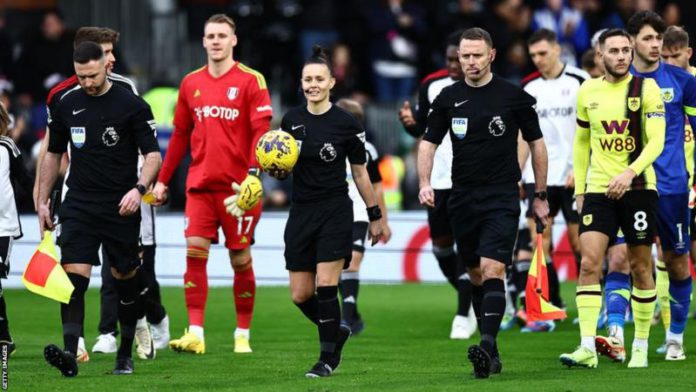
Rebecca Welch made history on Saturday when she became the first woman to referee a Premier League fixture.
The 40-year-old took charge of Burnley’s 2-0 victory over Fulham at Craven Cottage.
Welch became a referee in 2010 when she combined it with a job in the NHS, before becoming a full-time official in 2019.
In January, Welch became the first woman to referee a men’s fixture in the Championship.
She returned to Craven Cottage a month on from serving as the fourth official during Fulham’s 1-0 Premier League defeat by Manchester United.
Burnley manager Vincent Kompany, who spoke to Welch at full-time, said: “I wanted to congratulate her because it’s a big moment.
“After the game it’s fair to say that it’s a milestone moment and may there be more, and the best thing will always be when someone is judged on merit.
“But you have to have a first and this is it, so well done [to her] and I’m happy to be part of this moment.”
Welch was the first woman to take charge of an FA Cup third-round tie in 2022 after being added to the EFL’s national list for men’s football, which oversees both League One and League Two fixtures.
The referee, from Washington in Tyne and Wear, has been a leading light for English officials in the Women’s Super League.
Her work has been recognised on the international stage too as she was added to Fifa’s elite list of international match officials in December 2020, before refereeing at the Women’s World Cup in Australia and New Zealand in the summer.
“We have not seen a female take charge of a Premier League game ever before,” referees’ chief Howard Webb told BBC Sport.
“We have some really talented officials in the men’s and women’s game. Rebecca is leading that.
“She went to the World Cup in Australia and New Zealand. She has been exposed to some big games and is a really good model for women and girls to think refereeing is for them when previously they didn’t.”
In July, the Football Association laid out plans to recruit 50% more referees from “historically under-represented” backgrounds by 2026, targeting an increase of 1,000 women referees and 1,000 black or Asian referees at all levels of football in three years.





